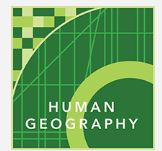ESRI-produced short 15 minute introductory lesson for topics in a variety of disciplines. Students are provided with maps and a series of questions are posed to guide the exploration of the map. The geoinquiries are designed to be used whole class under the direction of the teacher. But, as your level of comfort increases consider having students work through the exercises individually or in pairs.
- Distance, transportation, and scale
Students wil explore how not all distances are equally distant. - Understanding globalization
Students will investigate how connections are made across Earth. focusing on advancements in transportation and technology. - World Population
Students will explore the patterns of world population in terms of total population, arithmetic density, total fertility rate, natural increase, and infant mortality rate. - USA demographics
Students will explore U.S. Census data to see the spatial differences in the United States population. - You claim it, you name it
Students will learn about the variation of toponyms in different regions of the Americas. - Language and religion
Students will explore patterns of cultural diffusion through linguistic and religious data. - Sacred space, sacred place
Students will explore the location and distribution of religious world heritage sites around the world.
- Migration on the move
Students will use ArcGIS Online to evaluate migration at the global, regional, and local scales. - Borders, boundaries, and barriers
This lesson focuses on the identification of major boundaries, borders, and barriers around the world. - Farming, vegetation, and the rural landscape
This lesson focuses on the different types of use found in rural lands. - Agricultural Patterns
Students will explore global climatic datasets to analyze the factors that constrain and enable agricultural options. - Human Development Index
Students will explore the spatial patterns of the Human Development Index (HDI) to identify regional patterns and causal factors in the data. - Comparing Country Development
Explore factors that define levels of development. - What’s the Range?
Students will analyze how the market areas for specific chain stores change bases on the type of store. - Urban Areas and Edge Cities
Explore urban areas around the world, including the layout, size, and other factors.
Link to ESRI GeoInquiries™ page